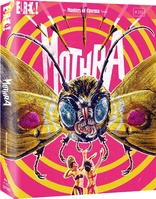Mothra Blu-ray Movie
HomeMothra Blu-ray Movie 
モスラ / Mosura | Masters of Cinema | Limited EditionEureka Entertainment | 1961 | 1 Movie, 2 Cuts | 101 min | Rated BBFC: PG | Nov 16, 2020
Movie rating
7.2 | / 10 |
Blu-ray rating
| Users | 0.0 | |
| Reviewer | 4.0 | |
| Overall | 4.0 |
Overview
Mothra (1961)
Two six-inch twins, kept captive by an evil sideshow owner, pray to their god Mothra to save them. What comes out is a giant mothlike creature which inadvertently weaves a path of destruction over Tokyo on the way to its rescue mission.
Starring: Hiroshi Koizumi, Kyōko Kagawa, Yūmi Itō, Emi Itō (III), Ken UeharaDirector: Ishiro Honda
| Foreign | Uncertain |
| Sci-Fi | Uncertain |
| Fantasy | Uncertain |
| Supernatural | Uncertain |
| Adventure | Uncertain |
| Drama | Uncertain |
| Family | Uncertain |
| Action | Uncertain |
| Mystery | Uncertain |
Specifications
Video
Video codec: MPEG-4 AVC
Video resolution: 1080p
Aspect ratio: 2.35:1
Original aspect ratio: 2.35:1
Audio
Japanese: LPCM 2.0 Mono (48kHz, 16-bit)
English: LPCM 2.0 Mono (48kHz, 24-bit)
Music: LPCM 2.0 Mono
Subtitles
English, English SDH
Discs
Blu-ray Disc
Single disc (1 BD)
Playback
Region B (C untested)
Review
Rating summary
| Movie | 4.0 | |
| Video | 3.5 | |
| Audio | 3.5 | |
| Extras | 3.5 | |
| Overall | 4.0 |
Mothra Blu-ray Movie Review
Reviewed by Jeffrey Kauffman January 7, 2021As a typically ebullient Kim Newman gets into in a supplement included on this Blu-ray disc, theres really no kaiju movie quite like Mothra. This weird and frankly kind of wacky movie was made in the wake of the incredible success of both the Godzilla franchise as well as Rodan, but its distinctly (and distinctively) different than either of those films and/or series in that it features a monster whos a hero (and/or heroine, as the case may be), not to mention what Newman refers to as the whimsy of elements like miniature singing and dancing twin fairies who summon Mothra to its adventures. As Newman's analysis as well as two commentary tracks get into, Mothra was conceived at least in part to appeal to female audiences, which may account in passing for some of its obviously unique aspects, and it was an early example of what might be called "stunt casting" or at least "tie in potential" due to its featuring of sisters Yumi Ito and Emi Ito, then part of a popular singing group known as The Peanuts, as those aforementioned miniature fairies, who are referred to as Shobijin (Small Beauties).
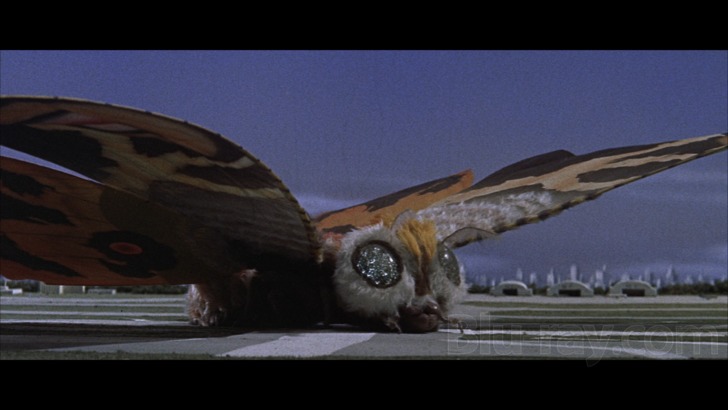
While there's maybe a bit of the nuclear holocaust subtext that informed at least the first Gojira, the film actually may recall another "big monster" movie, namely King Kong, in that there's a mysterious island with at least one mutant creature, as well as the fact that the film features a kind of unscrupulous promoter named Clark Nelson (Jerry Ito) who is intent on making moolah out of the situation. The film also has an undeniable and intentional comedic aspect, with copious amounts of shtick added courtesy of star Frankie Sakai as supposedly enterprising (if goofy) journalist Zen'ichirō Fukuda. With regard to Nelson, however, it's interesting to note that he doesn't capture and imprison Mothra for potential exhibition, but instead the two miniature singing and dancing fairies. Unfortunately for Nelson and others involved in this scheme, the fairies' song actually summons Mothra, in yet another kind of bizarrely charming element.
What's kind of interesting throughout all of this is the fact that it takes the bulk of the film for the "ultimate" version of Mothra to even be shown, and even the pupae forms of the creature which are initially shown don't make their first appearance until well into the story. As such, this is a kaiju effort which is rather strangely not all that dependent upon its gigantic monster, but one of the surprising things about Mothra is that it's so often such a gonzo entertainment anyway that it hardly matters. There is the requisite urban destruction in the film, which includes some quaint miniatures that may provoke laughter from younger viewers more accustomed to the blandishments of CGI, and even Mothra itself is admittedly kind of laugh worthy. But the film has a real sweetness that can't be denied, and it is certainly a manifestly different experience than either the first Godzilla or Rodan movie.
Mothra Blu-ray Movie, Video Quality 
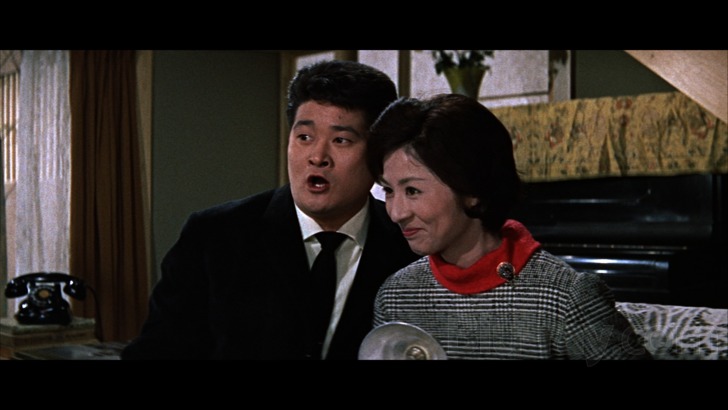
Mothra is presented on Blu-ray courtesy of Eureka! Entertainment's Masters of Cinema imprint with an AVC encoded 1080p transfer in 2.35:1. Judging solely by screenshots, I'm not seeing any huge variances between this release and Mill Creek's Mothra Blu-ray for the North American market which came out a few months before this one did. That said, I'm not quite as generous as Marty was in his review of that version (that said, I evidently like the film a bit more than Marty, as I'm more generous with that particular score). While this often has commendable fine detail levels (look at the pattern on Kyōko Kagawa's dress in screenshot 2, or even Mothra's fuzzy "monobrow" for want of a better descriptor in screenshot 1), whatever element was utilized looks a bit faded to me on occasion, with flesh tones verging toward brown, and a just kind of slightly dirty, dowdy appearance. That said, some reds are quite evocative and bright blue outdoor skies tend to resonate extremely well. Some of the old style optical compositing doesn't look especially great (see screenshot 19), and there is pretty noticeable flicker in some of the effects shot featuring Mothra flying in particular. Grain is generally natural looking, but can attain pretty clumpy, chunky yellowish qualities at times, as can be seen in several of the screenshots accompanying this review. There are small but recurrent signs of age related wear and tear. I noticed no substantial image quality difference between the Japanese and English language versions, despite their content differences. The credits on the English language version do look anamorphically stretched for some reason.
Mothra Blu-ray Movie, Audio Quality 
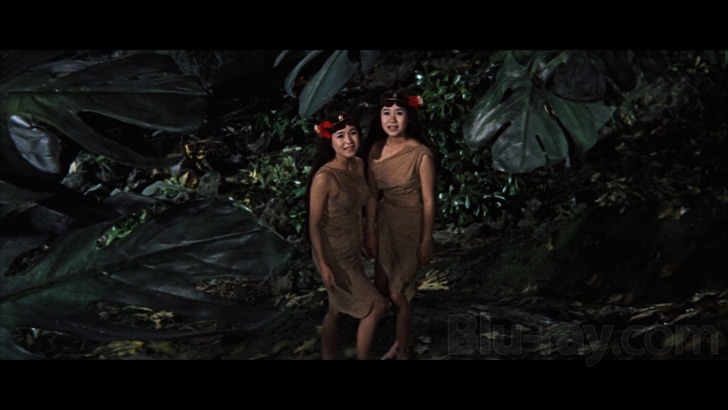
Mothra features three tracks, all LPCM 2.0 Mono, the original Japanese, an English dub, and a music and effects track offered on the Japanese version. Marty wasn't especially impressed by the audio on the Mill Creek release, and this version has some of the same thinness, especially in the upper registers, that Marty mentions in his review of the Mill Creek version. That said, I was generally pleased by the overall fidelity of the tracks, though some effects can sound pretty boxy and shallow. Dialogue is rendered cleanly and clearly for the most part, but encounters a couple of minor prioritization issues. Optional English subtitles are available.
Mothra Blu-ray Movie, Special Features and Extras 
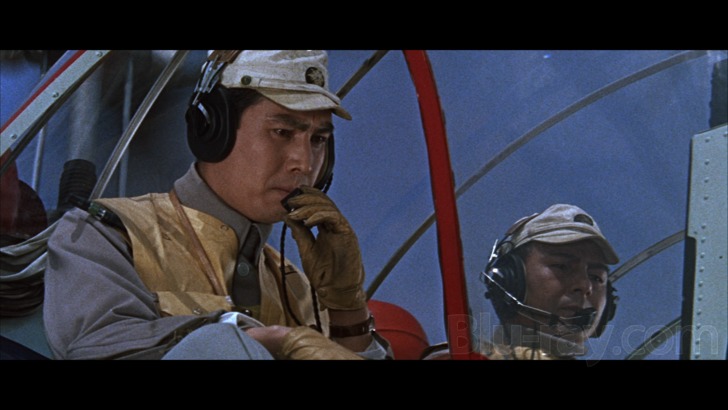
- Original Japanese Version (1080p; 1:40:51) and International English Dubbed Version (1080p; 1:30:12) are offered.
- Audio Commentary by film historian David Kalat is available under the Play Menu for the Original Japanese Version.
- Isolated Music & Effects Track is presented in LPCM 2.0 Mono and is available under the Play Menu for the Original Japanese Version.
- Audio Commentary by Steve Ryfle and Ed Godziszewski is available under the Play Menu for the International English Dubbed Version.
- Kim Newman on Mothra (HD; 14:42) is another fun visit with Newman, who always seems delighted to be talking about his subject, something that appears to be especially true with regard to Mothra.
- Stills Gallery #1 Production Stills and Ephemera (HD)
- Stills Gallery #2 Concept Art (HD)
- Teaser Trailer (HD; 1:25)
- Theatrical Trailer (HD; 1:56)
Mothra Blu-ray Movie, Overall Score and Recommendation 
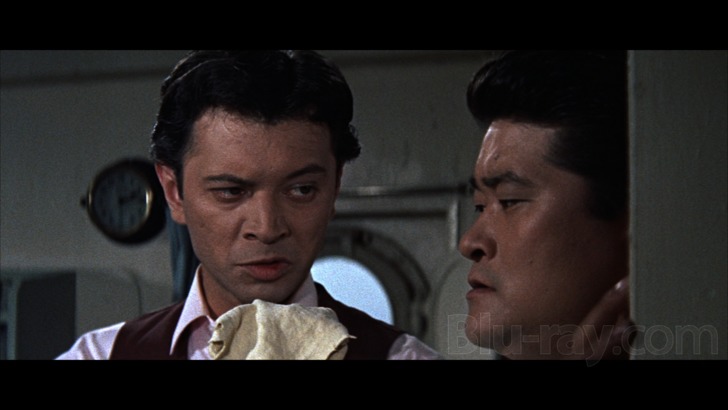
Godzilla: King of the Monsters may have helped rekindle interest in Mothra, but those who only know of the creature courtesy of that 2019 VFX extravaganza may be in for something of a shock when watching this decidedly lower tech 1961 film. That said, part of the charm of this enterprise is that very low tech approach (which was at least a bit more state of the art in its day), and this is certainly one of the weirder kaiju films to come out of Japan during this period. Technical merits encounter a couple of obstacles, but are generally solid, and the supplementary package is very appealing. Recommended.
Similar titles
Similar titles you might also like

Mothra vs. Godzilla
モスラ対ゴジラ / Mosura tai Gojira
1964

Gamera the Brave
Chiisaki yusha-tachi: Gamera
2006

Gamera: Guardian of the Universe
Gamera daikaijū kuchu kessen
1995

Gamera the Giant Monster
大怪獣ガメラ / Daikaijū Gamera
1965

Gamera 3: Revenge of Iris
Gamera 3: Iris kakusei
1999

Gamera vs. Viras
Gamera tai uchu kaijū Bairasu / Destroy All Planets
1968

Gamera vs. Barugon
Daikaijū kettō: Gamera tai Barugon
1966

Gamera vs. Gyaos
Daikaijū kūchūsen: Gamera tai Gyaosu
1967

Gamera vs. Guiron
Gamera tai daiakuju Giron
1969

Gamera vs. Jiger
Gamera tai Daimaju Jaiga
1970

Godzilla vs. Hedorah
ゴジラ対ヘドラ / Gojira tai Hedora / Godzilla vs. the Smog Monster
1971

Godzilla vs. Gigan
地球攻撃命令 ゴジラ対ガイガン / Chikyū kogeki meirei: Gojira tai Gaigan / Godzilla on Monster Island
1972

Invasion of Astro-Monster
怪獣大戦争 / Kaijū daisensō / Godzilla vs. Monster Zero
1965

Godzilla vs. Megalon
ゴジラ対メガロ / Gojira tai Megaro
1973

Gamera 2: Attack of the Legion
Gamera 2: Region shurai
1996

Terror of Mechagodzilla
メカゴジラの逆襲 / Mekagojira no gyakushu
1975

Destroy All Monsters
怪獣総進撃 / Kaijū sōshingeki
1968

Godzilla vs. Biollante 4K
ゴジラvsビオランテ / Gojira vs. Biorante
1989

Ebirah, Horror of the Deep
ゴジラ・エビラ・モスラ 南海の大決闘 / Gojira, Ebirā, Mosura: Nankai no daiketto / Godzilla vs. the Sea Monster
1966

Son of Godzilla
怪獣島の決戦 ゴジラの息子 / Kaijūtō no kessen: Gojira no musuko
1967
